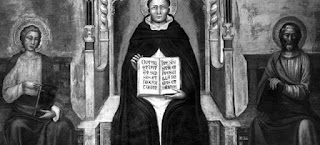1. The Master of Thought
“Today I wish to speak of the one whom the Church calls the Doctor communis namely, St Thomas Aquinas. In his Encyclical Fides et Ratio my venerable Predecessor, Pope John Paul II, recalled that ‘the Church has been justified in consistently proposing St Thomas as a master of thought and a model of the right way to do theology.’”
2. Cited 61 Times in the Catechism
“It is not surprising that, after St Augustine, among the ecclesiastical writers mentioned in the Catechism of the Catholic Church St Thomas is cited more than any other, at least 61 times! He was also called the Doctor Angelicus, perhaps because of his virtues and, in particular, the sublimity of his thought and the purity of his life.”
3. The Dawn of Aristotle
“In this period the culture of the Latin world was profoundly stimulated by the encounter with Aristotle’s works that had long remained unknown. They were writings on the nature of knowledge, on the natural sciences, on metaphysics, on the soul and on ethics and were full of information and intuitions that appeared valid and convincing.”
4. Fundamental to the History of Culture
“Thomas Aquinas, at the school of Albert the Great, did something of fundamental importance for the history of philosophy and theology, I would say for the history of culture: he made a thorough study of Aristotle and his interpreters, obtaining for himself new Latin translations of the original Greek texts. Consequently he no longer relied solely on the Arab commentators but was able to read the original texts for himself. He commented on most of the Aristotelian opus, distinguishing between what was valid and was dubious or to be completely rejected, showing its consonance with the events of the Christian Revelation and drawing abundantly and perceptively from Aristotle’s thought in the explanation of the theological texts he was uniting.”
5. Harmony of Faith and Reason
“In short, Thomas Aquinas showed that a natural harmony exists between Christian faith and reason. And this was the great achievement of Thomas who, at that time of clashes between two cultures that time when it seemed that faith would have to give in to reason showed that they go hand in hand, that insofar as reason appeared incompatible with faith it was not reason, and so what appeared to be faith was not faith, since it was in opposition to true rationality; thus he created a new synthesis which formed the culture of the centuries to come.”
6. Friendship: Noblest Manifestation of the Human Heart
“He was assisted in the composition of his writings by several secretaries, including his confrere, Reginald of Piperno, who followed him faithfully and to whom he was bound by a sincere brotherly friendship marked by great confidence and trust. This is a characteristic of Saints: they cultivate friendship because it is one of the noblest manifestations of the human heart and has something divine about it, just as Thomas himself explained in some of the Quaestiones of his Summa Theologiae. He writes in it: “it is evident that charity is the friendship of man for God” and for “all belonging to him” (Vol. II, q. 23, a. 1).”
7. An Exquisitely Eucharistic Soul
“Pope Urban IV, who held him in high esteem, commissioned him to compose liturgical texts for the Feast of Corpus Christi, which we are celebrating tomorrow, established subsequent to the Eucharistic miracle of Bolsena. Thomas had an exquisitely Eucharistic soul. The most beautiful hymns that the Liturgy of the Church sings to celebrate the mystery of the Real Presence of the Body and Blood of the Lord in the Eucharist are attributed to his faith and his theological wisdom.”
8. Worthless
“In December 1273, he summoned his friend and secretary Reginald to inform him of his decision to discontinue all work because he had realized, during the celebration of Mass subsequent to a supernatural revelation, that everything he had written until then “was worthless”. This is a mysterious episode that helps us to understand not only Thomas’ personal humility, but also the fact that, however lofty and pure it may be, all we manage to think and say about the faith is infinitely exceeded by God’s greatness and beauty which will be fully revealed to us in Heaven. A few months later, more and more absorbed in thoughtful meditation, Thomas died while on his way to Lyons to take part in the Ecumenical Council convoked by Pope Gregory X.”
9. Nothing But Yourself
“The life and teaching of St Thomas Aquinas could be summed up in an episode passed down by his ancient biographers. While, as was his wont, the Saint was praying before the Crucifix in the early morning in the chapel of St Nicholas in Naples, Domenico da Caserta, the church sacristan, overheard a conversation. Thomas was anxiously asking whether what he had written on the mysteries of the Christian faith was correct. And the Crucified One answered him: “You have spoken well of me, Thomas. What is your reward to be?”. And the answer Thomas gave him was what we too, friends and disciples of Jesus, always want to tell him: “Nothing but Yourself, Lord!” (ibid., p. 320).”


